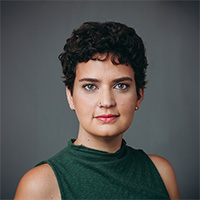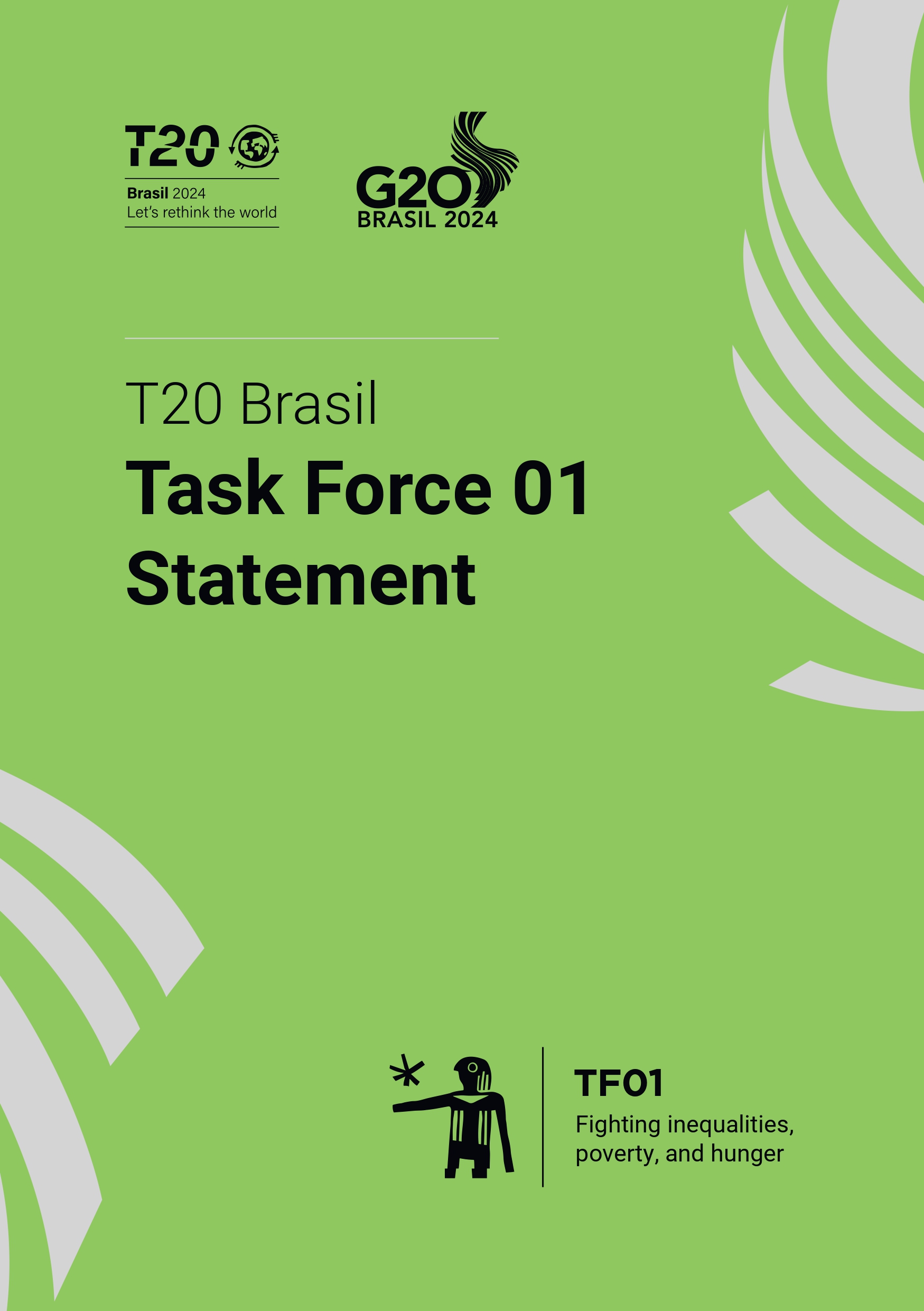
TF01
Fighting inequalities, poverty, and hunger
TF01 aims to put together policy recommendations that focus on the first priority of Brazil’s G20 presidency: 1) Fight poverty and hunger and promote social inclusion. In particular, it intends to offer inputs to the G20 Task Force on fighting poverty and hunger, but also look at all forms of inequalities, a priority of G20 Brazil Development Working Group, that can be addressed in a crosscutting manner by all G20 working groups of both Finance and Sherpa tracks.
This TF tackles several critical issues through these subtopics, contributing to accelerate progress towards multiple SDGs:
1.1. Promoting effective policies to fight poverty and hunger and the role of trilateral cooperation in their promotion: Emphasizing the importance of collaborative efforts at the Global level in combating poverty and hunger, the TF focuses on review of the available evidence on impactful policies that could be adapted and leveraged to support countries falling behind in SDG 1 and 2 through trilateral cooperation (SDGs 1, 2, 10, and 17).
- Lidia Cabral, IDS - Institute of Development Studies (United Kingdom)
- Chuanhong Zhang, CIDRN - China International Development Research Network (China)
- Andrea Santos Baca, UFABC - Federal University of ABC and REDAGRI - International Agri-Food Studies Network, Federal University of Paraíba (Brazil)
1.2. Fostering food security and nutrition through sustainable food systems: The TF will review and discuss pathways to sustainable food systems to ensure food security and improved nutrition. It will put forward approaches and policy reforms that are environmentally sustainable, socially, and economically sound and that foster resilience to climate change and other shocks, and that contributes to healthier, more productive, and more inclusive societies (SDGs 1, 2, 8, 13, 14, and 17).
- Dirce Marchioni, INCT - National Science and Technology Institute Fight Against Hunger (Brazil)
- Joachim Von Braun, ZEF - Center for Development Research, Bonn University (Germany)
- Laure Tall, IPAR - Initiative Prospective Agricole et Rurale (Senegal)
1.3. Expanding access to social protection and basic services: Recognizing the fundamental right to social protection throughout the life cycle and basic services (e.g. water and sanitation, housing), the TF will assess what is necessary to broaden access, adequacy, and comprehensiveness of social protection systems, ensuring its coherence with labour market policies, as well as inclusivity and support for vulnerable populations (SDGs 1, 2, 3, 4, 6, 8, 10, and 11).
- Rogerio Barbosa, IESP-UERJ - Institute of Social and Political Studies, State University of Rio de Janeiro (Brazil)
- Helga Cuéllar-Marchelli, FUSADES - Salvadorian Foundation for Social and Economic Development (El Salvador)
- Flora Myamba, Gender and Social Protection (Tanzania)
1.4. Promoting universal health coverage, digital health, and open innovation to fight health inequalities: The TF will put forward proposals to address health inequalities and to ensure universal health coverage while leveraging digital health and open innovation to bridge gaps in healthcare accessibility and quality without overlooking the need for redundancies to avoid digital exclusion (SDGs 3, 9, and 10).
- Marco Aurelio de Carvalho Nascimento, Center of Strategic Studies, FIOCRUZ - Oswaldo Cruz Foundation (Brazil)
- Stefano Vella, Catholic University of Rome (Italy)
- Guilherme Faviero, AHF Global Public Health, University of Miami (United States)
1.5. Reforming fiscal policies to reduce inequalities and eradicate poverty: The TF will focus on fiscal policies aimed at reducing economic disparities and eradicating poverty. The TF seeks to create more equitable tax-transfer systems with a view to curbing both opportunities and results inequalities and fostering social cohesion (SDGs 1 and 10).
- Pedro Rossi, Economic Institute, UNICAMP - State University of Campinas (Brazil)
- Veronica Serafini, Latindadd (Regional)
- Florencia Lorenzo, Tax Justice Network (Global)
1.6. Fighting gender discrimination and inequalities and rethinking the care economy: Recognizing the inherent gender discrimination and inequalities at all levels and in different sectors, the TF will look at policies that have successfully reduced discrimination and/or its consequences. It will bring recommendations for fighting gender discrimination in all its aspects, and recommendations that can produce changes in the care economy, where women are over-represented, with a view to promoting inclusivity and equity (SDGs 1,3,4,5,8,10,16, and Brazil's SDG 18).
- Hania Sholkamy, Social Research Center, American University in Cairo (Egypt)
-
Lorena Hakak, GeFam - Family and Gender Economics Study Group (Brazil)
-
Imraan Valodia, Southern Centre for Inequality Studies, University of the Witwatersrand (South Africa)
1.7. Fighting race and ethnic discrimination and inequalities: Emphasizing the moral imperative as well as the developmental rationale to combat race and ethnic discrimination and inequalities, the TF will put forward recommendations for G20 members to foster global cooperation with a view to encouraging policies that dismantle discriminatory practices and promoting diversity. Suggestions should include comprehensive reforms in education, employment, and legal frameworks. The task force advocates for inclusive policies that uplift marginalized communities, creating opportunities for economic empowerment and social cohesion.
- Paulo Ramos, AfroCEBRAP - Center for Research and Education on Race, Gender and Social Justice (Brazil)
- Omolara Oriye, Liberation Africa Alliance (Regional)
- Michael Hanchard, Africana Studies Department, University of Pennsylvania (United States)
By addressing these comprehensive subtopics, the T20 Brasil TF01 endeavors to recommend impactful policies and actions that not only fight inequalities, poverty, and hunger, but also pave the way for sustainable and inclusive growth globally.
Click here to access TF01's LinkedIn community: https://www.linkedin.com/groups/12956042/
LEAD CO-CHAIRS

Luiza Nassif Pires
Director, Research Center on Macroeconomics of Inequalities (Made-USP)

Gala Díaz Langou
Executive Director, Center for the Implementation of Public Policies Promoting Equity and Growth (CIPPEC)
DEPUTY LEAD CO-CHAIR

Rayane Barros
Project Coordinator, Research Center on Macroeconomics of Inequalities (Made-USP)

Sofía Fernandez Crespo
Chief of Staff, Center for the Implementation of Public Policies Promoting Equity and Growth (CIPPEC)
TASK FORCE STATEMENT
